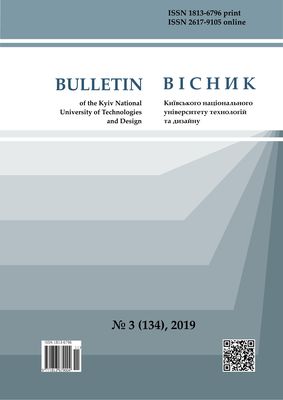TEXTILES FOR ELECTROMAGNETIC RADIATION SHIELDING
DOI:
https://doi.org/10.30857/1813-6796.2019.3.5Keywords:
electromagnetic interference, textile shield, metal fibers, surface treatmentAbstract
Analysis of existing textile materials used for electromagnetic radiation shielding, their systematization, and basic production methods are the main goals of this review. Methodology. The review of scientific literature and the systematization of the results in the field "textile materials for electromagnetic interference" are the main methods used for this research. Shielding materials based on textile materials are widely used for protection against electromagnetic radiation (EMR) from existing electrical and electronic devices. Methods for imparting shielding properties to textile materials can be classified in two directions: surface treatment and fillers. The solutions used to add conductivity to textiles are very diverse and depend on the shield application. However, surface treatment is often time consuming and expensive. The introduction of fillers in the form of particles, fibers, threads and fabrics into the material are increasingly using to create electromagneticshields. Textile shielding materials are made from conductive polymers, metal fibers (carbon, stainless steel, copper, etc.), metal wires, metal-coated threads or multifilaments. Generally, the electrical conductivity and shielding efficiency from EMI of all textile materials (woven, knitted, non-woven fabrics) are improved by
incorporating metal fibers, metal particles or conductive polymers into them at different production stages. Scientific novelty. The detailed analysis of textile materials for shielding against electromagnetic radiation and of the research works in this field are presented in this review. The existing methods for
producing textile shields are systematized by the authors. Practical value. It is a familiarization of a wide circle of specialists with the current state of the problem of protection against electromagnetic radiation. The main trends and prospects for the development of textile materials for electromagnetic shielding are identified as a result of this review.
Downloads
Download data is not yet available.
Downloads
Published
2019-11-12
Issue
Section
Materials Science. Textile and Apparel Manufacturing

